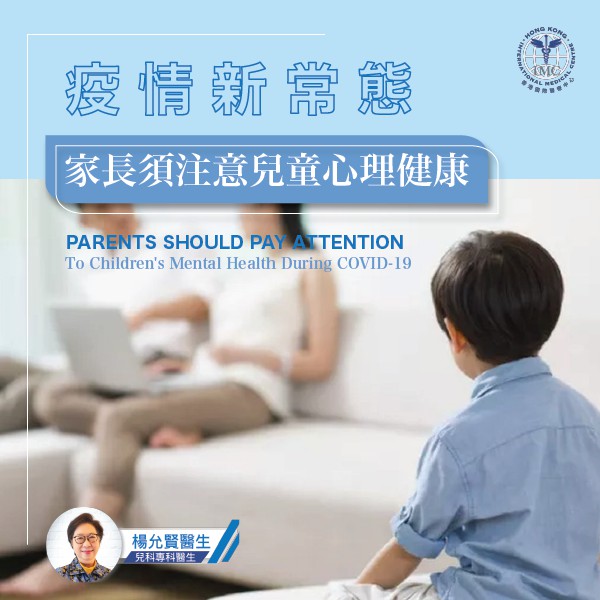Parents Should Pay Attention To Children's Mental Health During COVID-19
Publish date:2021-03-04
Families across the country are adapting to the evolving changes in daily life caused by the COVID-19 pandemic. Most schools, places of public gathering, and nonessential businesses are closed, parents and other caregivers are faced with helping their families adjust to the new normal. This includes trying to keep children occupied, feeling safe, and attempting to keep up with schoolwork as best as possible. None of this is easy, but it helps to stay focused on what is possible in order to reinforce a sense of control and to reassure children that they are okay, and that the situation will get better.
Modelling basic hygiene and healthy lifestyle practices
Most children manage well with the support of parents and other family members, even if showing signs of some anxiety or concerns, such as difficulty sleeping or concentrating. Some children, however, may have risk factors for more intense reactions, including severe anxiety, depression, and suicidal behaviours.
Risk factors can include a pre-existing mental health problem, prior traumatic experiences or abuse, family instability, or the loss of a loved one. Parents and caregivers should contact a professional if children exhibit significant changes in behaviour or any of the following symptoms for more than 2 weeks:
Monitor television viewing and social media
Let your children's questions guide you. Answer their questions truthfully, but don't offer unnecessary details or facts. Do not avoid giving them the information that experts indicate as crucial to your children's well-being. Children always feel empowered if they can control some aspects of their life and a sense of control reduces fear.
Source: Specialist in Paediatrics, Dr. Young Wan Yin, Betty

Modelling basic hygiene and healthy lifestyle practices
- Practice daily good hygiene by encouraging your child to practice these simple steps to prevent spreading the virus.
- Wash your hands multiple times a day for 20 seconds. Singing “Twinkle, Twinkle Little Star” or “Happy Birthday” twice is about 20 seconds.
- Compliment your children when they use a tissue, or sneeze/ cough into the bend of their elbow, and teach them the importance of throwing away used tissues immediately after sneezing or coughing.
- Handshakes and hugs need to be limited to immediate family members.
- Offering guidance on what your children can do to prevent infection offers them a greater sense of control, which reduces anxiety.
- Encourage your child to eat a balanced diet, get enough sleep, and exercise regularly, this helps them develop a robust immune system to fight off illness.
- Locating learning resources. Most schools are providing lessons and learning activities for children to do, parents can also take advantage of the many companies and online platforms which currently offer free learning opportunities.
- Stay in touch. Be sure to read any communications you receive. Check with you children, particularly older ones, as they may be receiving information directly that would be helpful for you to know.
- Connect with school staff. Reach out to your child’s teacher and other relevant school staff if you have concerns about their coping and keeping up with assignments or activities.
Most children manage well with the support of parents and other family members, even if showing signs of some anxiety or concerns, such as difficulty sleeping or concentrating. Some children, however, may have risk factors for more intense reactions, including severe anxiety, depression, and suicidal behaviours.
Risk factors can include a pre-existing mental health problem, prior traumatic experiences or abuse, family instability, or the loss of a loved one. Parents and caregivers should contact a professional if children exhibit significant changes in behaviour or any of the following symptoms for more than 2 weeks:
- Pre-schoolers—thumb sucking, bedwetting, clinging to parents, sleep disturbances, loss of appetite, fear of the dark, regression in behaviour, and withdrawal.
- Elementary school children—irritability, aggressiveness, clinginess, nightmares, school avoidance, poor concentration, and withdrawal from activities and friends.
- Adolescents—sleeping and eating disturbances, agitation, increase in conflicts, physical complaints, delinquent behaviour, and poor concentration.
Monitor television viewing and social media
- Parents/guardians should monitor television, internet, and social media viewing for themselves and their children. Watching continual updates on COVID-19 may cause anxiety or confusion, particularly in young children.
- Talk to your child about factual disease information. Explain to your child that many stories about COVID-19 on the internet may include rumours and inaccurate information. Older children, in particular, may be accessing a great deal of information online and from friends that contains inaccuracies.
- Provide alternatives. Engage your child in games or other exciting activities instead.
Let your children's questions guide you. Answer their questions truthfully, but don't offer unnecessary details or facts. Do not avoid giving them the information that experts indicate as crucial to your children's well-being. Children always feel empowered if they can control some aspects of their life and a sense of control reduces fear.
- Early elementary school children: Provide brief, simple information that balances COVID-19 facts with appropriate reassurances that adults will keep them healthy and take care of them if they do get sick.
- Upper elementary and early middle school children: This age group often is more vocal in asking questions about whether they indeed are safe and what will happen if COVID-19 spreads in their area. Discuss the efforts national, state, and community leaders are doing to prevent germs from spreading.
- Upper middle and high school students: Issues can be discussed in more depth. Refer them to appropriate sources of COVID-19 facts. Provide honest, accurate, and factual information about the current status of COVID-19. Engage them in decision-making about family plans, scheduling, and helping with chores at home.
- Be a role model. Children will react to and follow your reactions. They learn from your example.
- Be aware of how you talk about COVID-19. Your discussion about COVID-19 can increase or decrease your child's fear. Remind your child that your family is healthy, and you are going to do everything within your power to keep loved ones safe and well.
- Explain social distancing. Children may not fully understand why parents/guardians aren’t allowing them to be with friends. Tell your child that social distancing means staying away from others until the risk of contracting COVID-19 is under control.
- Do breathing exercises with your children. Deep breathing is a valuable tool for calming the nervous system.
- Focus on the positive. Celebrate having more time to spend as a family. Make it as fun as possible. Do family projects to connect with nature and get needed exercise. Allow older children to connect with their friends virtually.
- Establish and maintain a daily routine. Keeping a regular schedule provides a sense of control, predictability, calm, and well-being.
- Offer lots of love and affection. Identify projects that might help others, such as writing letters to the neighbours or others who might be stuck at home alone or to healthcare workers; sending positive messages over social media.
Source: Specialist in Paediatrics, Dr. Young Wan Yin, Betty









